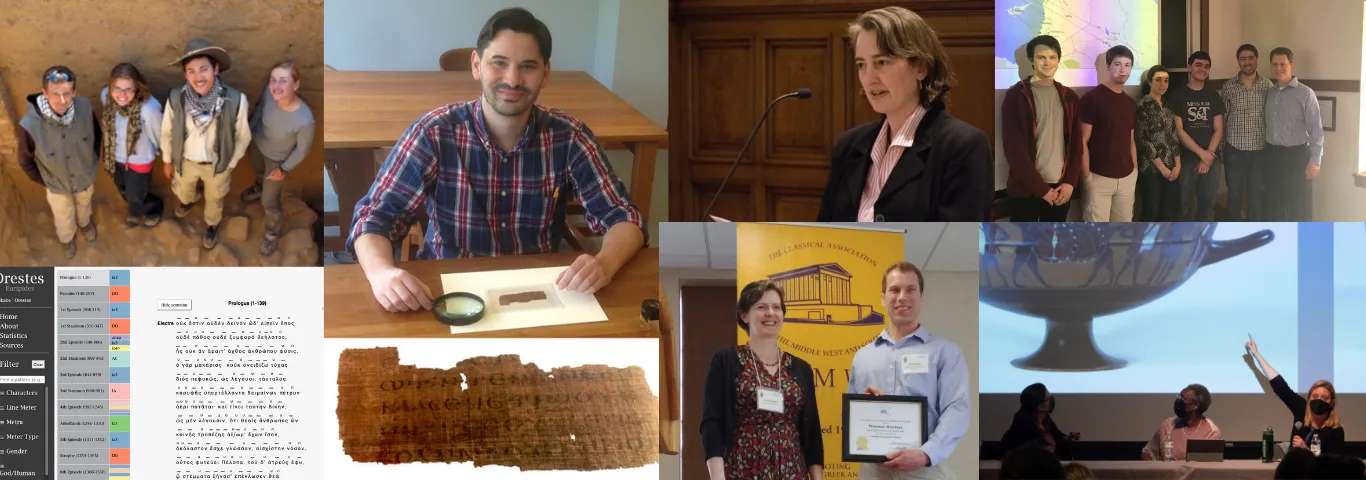Research Across the Department
The Classics faculty engages in research across many areas of the ancient Greek and Roman worlds. The cultures and literatures of the Roman empire are especially well represented; our faculty includes experts in areas such as education, literary reception, medicine, music and performance, material culture, religion, and economics. We are also proud of our work on other rich topics ranging from early Greece to Classical reception and pedagogy, areas in which we also support student research. Collaboration with students also enriches faculty research: undergraduate and graduate assistants participate in numerous ongoing projects.
Recent Faculty Research
Nicola Aravecchia’s latest book project explores early Christianity in Egypt and focuses on a fourth-century church that he and his team excavated at the site of Amheida (ancient Trimithis), in Egypt’s Western Desert. Also, an essay entitled “Christian Identity in the Archaeological Record: Evidence from Egypt’s Western Desert” is forthcoming (2023) in a volume on Coptic Studies published by the American University in Cairo Press. Nicola also co-authored an article with Dr. Nathan Chase (Aquinas Institute of Theology, St. Louis) entitled “The Use and Capacity of Early Churches in Dakhla Oasis: A Liturgical and Archaeological Perspective.” The article appeared in Antiquité Tardive in 2023.
William Bubelis has been continuing work on the Wulfing catalogue and database. His recent publications and projects have ranged from Greek numismatics and economics to Athenian legal and religious institutions to politics in Greek oratory.
Ian Hollenbaugh is developing a monograph on the Indo-European verb, as well as digital corpora of texts that he has tagged in his research on the uses of various tenses in context.
Lance Jenott studies both New Testament apocrypha and Egyptian monastic literature that reveals facets of ancient Egyptian Christianity beyond the confines of Scripture and orthodox doctrines. He is currently writing a commentary on the Gospel of Judas for the Hermeneia series. He recently published a translation of the Coptic Investiture of the Archangel Gabriel, as well as an edition, translation, and literary-historical analysis of The Book of the Foreigner from Codex Tchacos in the Bulletin of the American Society of Papyrologists.
Cathy Keane is writing a commentary on Juvenal’s fifth book of Satires (poems 13-16) for the Cambridge Greek and Latin Classics Series. She is also engaged in an ongoing exploration of the poetics of Roman satire and related genres, including Juvenal's reception of Vergil and intertextuality between the Epigrams of Martial and the Satires of Juvenal.
Tom Keeline has published two books, one on The Reception of Cicero in the Early Roman Empire (2018), the other a commentary on Cicero’s speech Pro Milone (2021). Other recent publications have ranged from the first century BC (“Were Cicero’s Philippics the Cause of his Death?”) through the nineteenth century and twentieth centuries AD (“Are You Smarter than a Sixth-Former? Verse Composition and Linguistic Proficiency in Victorian Classical Exams”; Ronald Knox), with stops along the way in the first century AD (word order in Pliny the Younger; the working methods of Asconius), late(r) antiquity (the Latin Anthology; Terentianus Maurus; Priscian), and the early modern period (Isaac Casaubon; Count Zinzendorf and Moravian Latin). Forthcoming publications include a substantial article on the the challenges of Latin vocabulary and reading Latin, co-authored with Tyler Kirby (TAPA 153.2, fall 2023).
Tom is now completing a digital edition of and textual commentary on Ovid’s Ibis, which he expects to submit in spring 2024. He then will turn to writing a book with Stuart McManus, tentatively entitled The Origins of Western Civ? In Search of the Classical Tradition. Through case studies that whisk readers across continents and through centuries from late antiquity to the present, the book introduces readers to the ebb and flow of “Western Civ” as a story of contact and continuous evolution on a global scale, arguing that “Western Civilization” is much more composite in its formation and blended at its edges than most people imagine.
Tim Moore works primarily on how metrical patterns in the texts of ancient plays can reveal their musical structure. He has recently published articles and chapters entitled “Roman Comedy and the Final Dance” and “Ancient Plays: Are They Musicals?”. He is working on a book entitled “Musical Theater in Ancient Greece and Rome,” and—with numerous student assistants—on a database of the meters of Greek drama. He is also co-editing volumes on musical structure in Greek tragedy and on an all-women performance of Plautus’ Rudens in 1884 at Washington University.
Luis Salas has published a book on Galen’s anatomical experiments, and has been working on shorter projects concerned with Galen’s anatomy, physiology, definitions of disease, and approach to psychological disease.
Rebecca Sears is writing a textbook on ancient Greek and Roman music. She also researches Ovid’s poetry and its reception.
Kate Wilson’s research in the field of Hellenistic didactic and scientific poetry and poetics is represented in numerous short publications and a book in progress. She has also been exploring topics in Classical pedagogy and race, on the topic of which she organized a special exhibition at the Kemper Art Museum and a new course.
















